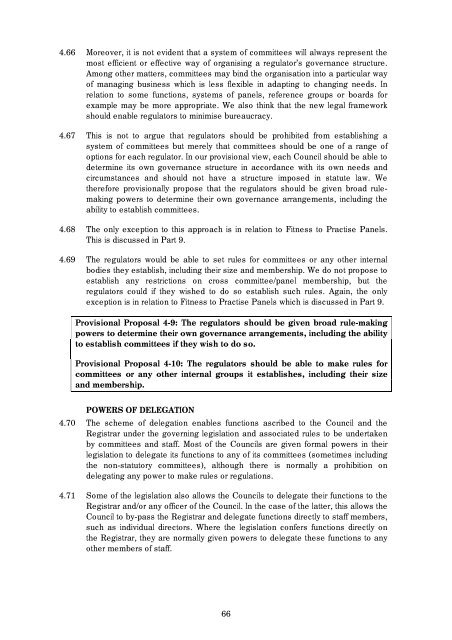Regulation of Health and Social Care Professionals Consultation
Regulation of Health and Social Care Professionals Consultation
Regulation of Health and Social Care Professionals Consultation
Create successful ePaper yourself
Turn your PDF publications into a flip-book with our unique Google optimized e-Paper software.
4.66 Moreover, it is not evident that a system <strong>of</strong> committees will always represent the<br />
most efficient or effective way <strong>of</strong> organising a regulator’s governance structure.<br />
Among other matters, committees may bind the organisation into a particular way<br />
<strong>of</strong> managing business which is less flexible in adapting to changing needs. In<br />
relation to some functions, systems <strong>of</strong> panels, reference groups or boards for<br />
example may be more appropriate. We also think that the new legal framework<br />
should enable regulators to minimise bureaucracy.<br />
4.67 This is not to argue that regulators should be prohibited from establishing a<br />
system <strong>of</strong> committees but merely that committees should be one <strong>of</strong> a range <strong>of</strong><br />
options for each regulator. In our provisional view, each Council should be able to<br />
determine its own governance structure in accordance with its own needs <strong>and</strong><br />
circumstances <strong>and</strong> should not have a structure imposed in statute law. We<br />
therefore provisionally propose that the regulators should be given broad rulemaking<br />
powers to determine their own governance arrangements, including the<br />
ability to establish committees.<br />
4.68 The only exception to this approach is in relation to Fitness to Practise Panels.<br />
This is discussed in Part 9.<br />
4.69 The regulators would be able to set rules for committees or any other internal<br />
bodies they establish, including their size <strong>and</strong> membership. We do not propose to<br />
establish any restrictions on cross committee/panel membership, but the<br />
regulators could if they wished to do so establish such rules. Again, the only<br />
exception is in relation to Fitness to Practise Panels which is discussed in Part 9.<br />
Provisional Proposal 4-9: The regulators should be given broad rule-making<br />
powers to determine their own governance arrangements, including the ability<br />
to establish committees if they wish to do so.<br />
Provisional Proposal 4-10: The regulators should be able to make rules for<br />
committees or any other internal groups it establishes, including their size<br />
<strong>and</strong> membership.<br />
POWERS OF DELEGATION<br />
4.70 The scheme <strong>of</strong> delegation enables functions ascribed to the Council <strong>and</strong> the<br />
Registrar under the governing legislation <strong>and</strong> associated rules to be undertaken<br />
by committees <strong>and</strong> staff. Most <strong>of</strong> the Councils are given formal powers in their<br />
legislation to delegate its functions to any <strong>of</strong> its committees (sometimes including<br />
the non-statutory committees), although there is normally a prohibition on<br />
delegating any power to make rules or regulations.<br />
4.71 Some <strong>of</strong> the legislation also allows the Councils to delegate their functions to the<br />
Registrar <strong>and</strong>/or any <strong>of</strong>ficer <strong>of</strong> the Council. In the case <strong>of</strong> the latter, this allows the<br />
Council to by-pass the Registrar <strong>and</strong> delegate functions directly to staff members,<br />
such as individual directors. Where the legislation confers functions directly on<br />
the Registrar, they are normally given powers to delegate these functions to any<br />
other members <strong>of</strong> staff.<br />
66
















